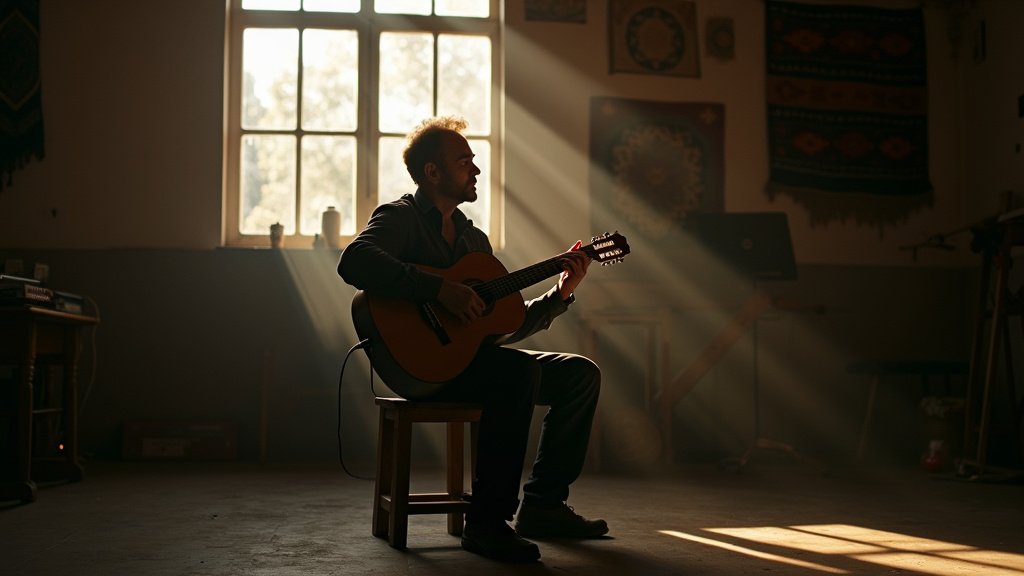After a hiatus of over thirty years, Chilean-born, Emmy award-winning composer and guitarist Patricio Morales has returned with “La Tierra Canta” (The Earth Sings), an album that is both a profound rediscovery of his earliest compositions and a vibrant statement of his enduring connection to his Latin American heritage.
A Return from Silence: The Genesis of La Tierra Canta
Morales, who has spent over two decades working internationally, including a significant period in Europe and composing soundtracks that earned him an Emmy, now finds himself back in the United States, teaching at institutions like Marist College and the Bard College Conservatory of Music. His return to recording with “La Tierra Canta” is not merely a continuation of his career but a deliberate re-engagement with the foundational pieces of his musical journey. The album meticulously reinterprets nine of his earliest compositions, imbuing them with the depth and perspective gained over decades of artistic exploration. Morales describes this process as one where creation is not forced but emerges inevitably when the time is right, making this album feel like a timely and essential offering.
Musical Tapestry: Guitar, Collaboration, and Heritage
Central to “La Tierra Canta” is Morales’s signature guitar playing, characterized by a quiet precision, crystalline clarity, and a masterful restraint. Rather than resorting to overt ornamentation, his approach seeks to uncover the inherent beauty within each note and melody. This intimate guitar work is amplified by a rich tapestry of arrangements featuring a multinational ensemble. Musicians from Argentina, Colombia, Peru, Brazil, and Chile contribute their talents, expanding the album’s vision into a pan-continental dialogue. This collaborative spirit underscores the expansive nature of “latin music,” illustrating it not as a singular genre but as a vast geography of interwoven rhythms, traditions, and voices. The inclusion of instruments like accordion and mandolin alongside his classical guitar weaving subtle jazz elements throughout, creating a soundscape that is both exotically resonant and deeply personal.
Echoes of Memory: Themes of Identity and Belonging
“La Tierra Canta” delves into profound thematic territories, exploring memory, family, and identity, all deeply rooted in Morales’s Chilean upbringing and his broader Latin American inheritance. The compositions are described as “impressionistic memories” and “lyrical vignettes,” offering listeners a window into personal histories and cultural landscapes. This thematic richness is not abstract; it is woven into the very fabric of the music, evoking a sense of belonging and reflection. The album’s emotional core, while carried by laid-back rhythms, is described as “welling with emotion,” offering a complex yet serene listening experience.
An Intimate Invitation: The Album’s Evocative Power
Unlike works that strive for grand spectacle, “La Tierra Canta” invites listeners into an experience of deep intimacy and contemplation. The album’s serene quality is palpable, yet it carries an underlying urgency—a testament to the timelessness of its themes and Morales’s mature artistic voice. Critics have noted the music’s ability to feel both “urgent and serene,” a balance that speaks to the composer’s ability to capture the complexities of life and memory. After years immersed in jazz, rock, and classical genres, Morales sought something “more exotic” which, in the context of “La Tierra Canta,” translates not to foreignness but to an authentic return to the essence of his musical roots, presented with newfound clarity and soulful expression. These reviews suggest an album that provides a meditative journey for its audience.
In conclusion, Patricio Morales’s “La Tierra Canta” is more than just a musical release; it is a significant artistic statement marking a triumphant return. It is an album that honors heritage, embraces collaboration, and showcases a master guitarist at the peak of his expressive powers, offering a serene yet urgent reminder of the enduring beauty found in rediscovered melodies and ancestral connections within the realm of latin music.



























